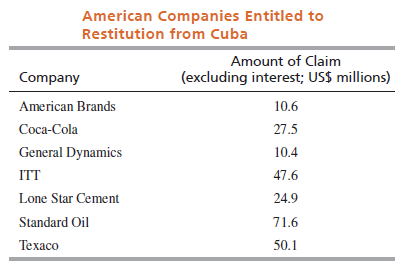1. What was the key issue that prompted the EU to take the Helms-Burton dispute to the...
Question:
2. Who benefits the most from an embargo of this type? Who suffers?
3. Now that the United States and Cuba have resumed diplomatic relations, what is the likelihood that U.S. legislators will lift the trade embargo?
When Barack Obama was sworn in as the 44th president of the United States, he inherited a situation that had confounded his predecessors in the Oval Office for more than half a century. The problem was Cuba, the tiny island nation in the Caribbean that, until recently, had been ruled by Fidel Castro. During his nearly 50 years in power, Fidel Castro remained unrepentant and clung unapologetically to socialist economic policies. In denouncing €œneo-liberal globalization,€ Castro said, €œThe more contact we have with capitalism, the more repugnance I feel.€ Shortly after Castro came to power, the United States severed diplomatic and trade relations with Cuba. In 2008, his health failing, Castro handed over the levers of power to his brother Raúl. And, as the newly elected American president set out an ambitious agenda for sweeping policy changes, many observers wondered whether it was time for a new era of trade, support, and cooperation with Cuba.
In December 2014, with two years left in his administration, President Obama took executive action: He announced that the United States and Cuba had reestablished diplomatic relations. The president€™s move opened the door to the possibility of lifting a decades-long trade embargo. The U.S. Chamber of Commerce and the Texas Business Council were among the first to endorse the president€™s action. However, some political leaders from both parties opposed the policy change on the grounds that €œengagement€ with the Cuban government would not lead to increased political freedom for the Cuban people.
€œWhat I know deep in my bones is that if you€™ve done the same thing for fifty years and nothing€™s changed, you should try something different.€
U.S.-Cuba Relations: A Brief History
Cuba is a Communist outpost in the Caribbean where the official national motto is €œ¡Socialismo o Muerte!€ (€œSocialism or Death!€). After Castro came to power in 1959, his government took control of most private companies without providing adequate compensation to the owners and shareholders. American assets, including factories, oil refineries, and land owned by both individuals and companies worth approximately $1.8 billion, were among those expropriated. When interest is figured in, those assets are worth about $7 billion today (see Table 1). In 1962, President John F. Kennedy responded by imposing a trade embargo on the island nation. Five decades later, when Castro finally stepped down, no significant changes were made to U.S. policy.
In 1990, Castro opened his nation€™s economy to foreign investment; by the mid-1990s, foreign commitments to invest in Cuba totaled more than half a billion dollars. In 1993, Castro decreed that the U.S. dollar was legal tender although the peso would still be Cuba€™s official currency. As a result, hundreds of millions of dollars were injected into Cuba€™s economy; Cuban exiles living in the United States were the source of much of the money. Cubans were able to spend the dollars in special stores that stocked imported foods and other hard-to find products. In a country where doctors are among the highest-paid workers, with salaries equal to about $20 per month, the cash infusions significantly improved a family€™s standard of living. In 1994, mercados agropecuarios (€œfarmers€™ markets€) were created as a mechanism to enable farmers to earn more money.
Table 1

Step by Step Answer:






